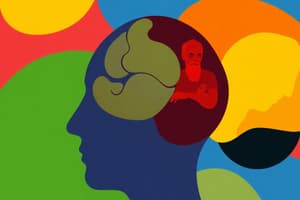Podcast
Questions and Answers
What is the definition of psychology?
What is the definition of psychology?
A science that describes and explains how we think, feel, and act.
Who conducted the first psychological experiment and when?
Who conducted the first psychological experiment and when?
Wilhelm Wundt in 1879.
Which psychological theory emphasized the power of the unconscious mind?
Which psychological theory emphasized the power of the unconscious mind?
- Humanistic Psychology
- Cognitive Psychology
- Psychoanalytic Theory (correct)
- Behaviorism
What major concept did Carl Rogers contribute to psychology?
What major concept did Carl Rogers contribute to psychology?
John Watson and B.F. Skinner are known for developing the theory of cognitive psychology.
John Watson and B.F. Skinner are known for developing the theory of cognitive psychology.
Abraham Maslow developed which famous psychological concept?
Abraham Maslow developed which famous psychological concept?
Which type of research examines the statistical relationship between two traits or behaviors?
Which type of research examines the statistical relationship between two traits or behaviors?
Wilhelm Wundt is often referred to as the ___ of Psychology.
Wilhelm Wundt is often referred to as the ___ of Psychology.
Flashcards are hidden until you start studying
Study Notes
Definition of Psychology
- Psychology is a scientific discipline focused on understanding how individuals think, feel, and behave.
- It encompasses the study of both behavioral and mental processes.
Brief History of Psychology
- John Locke introduced the concept of "Tabula Rasa" in the 1600s, suggesting that the mind is a blank slate at birth.
- Wilhelm Wundt (1832-1920) established psychology as a scientific field by conducting the first psychological experiment in 1879 at the University of Leipzig, defining it as the "Science of Mental Life."
- Edward Titchener, a student of Wundt, developed Structuralism, emphasizing introspection and self-report data to understand the mind’s structure.
- William James (1842-1910), a pioneer of Functionalism, explored the purposes of thoughts and behaviors, contributing significantly to psychology with his book "Principles of Psychology" and promoting the idea of survival through adaptive behaviors.
- Mary Calkins, admitted to James' seminar, became the first female president of the APA, overcoming gender barriers in psychology.
- Margaret Washburn (1871-1939) was the first woman to earn a Ph.D. in psychology, known for her work "The Animal Mind" (1908).
- Charles Darwin's evolutionary theory influenced psychology, proposing that natural selection affects both physical and behavioral traits essential for survival.
- Sigmund Freud introduced Psychoanalytic Theory, emphasizing the unconscious mind, formative childhood experiences, and dream analysis, while also being noted as a cocaine addict and asserting personality is shaped by age five.
- Humanistic Psychology, established by Carl Rogers (1902-1987), stressed the importance of personal growth and fulfillment, advocating for Client-Centered Therapy where the client leads the discussion.
- Abraham Maslow proposed a hierarchy of needs, ranging from survival to self-actualization, emphasizing that higher-level needs emerge only after basic needs are satisfied.
- John Watson and B.F. Skinner pioneered Behaviorism in 1913, defining psychology exclusively in terms of observable behavior, dismissing introspection, and focusing on classical and operant conditioning.
- Aaron Beck (1960) founded Cognitive Psychology, investigating how people perceive, process, and remember information, known for "Beck’s Cognitive Theory."
Chapter 1: The Scientific Method
- The scientific method involves observing the world, forming hypotheses, making predictions, and testing them, leading to new insights.
- Descriptive Research gathers general behavioral data through methods like case studies or surveys.
- Correlational Research investigates the relationship between two traits or behaviors, distinguishing between positive and negative correlations while noting that correlation does not imply causation.
- Experimental Research manipulates independent variables to observe their effect on dependent variables, analyzing outcomes to establish causal relationships.
Studying That Suits You
Use AI to generate personalized quizzes and flashcards to suit your learning preferences.




